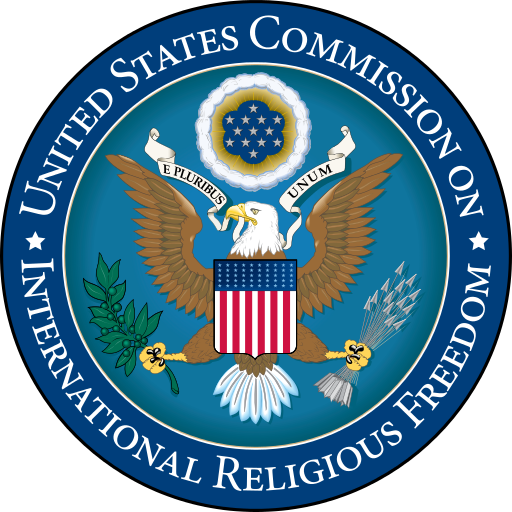Today’s guest column is written by Sarah Jones, Communications Associate for Americans United for Separation of Church and State. The views expressed in this piece belong to Jones and do not necessarily reflect those of her employer.

Logo of the United States Commission on International Religious Freedom. Via Wikimedia Commons.
Islamic radicalism dominates headlines around the world, and some experts believe international religious freedom initiatives offer the solution to the threat.
Are these initiatives really the answer to radicalism, or have their supporters oversold their potential value?
In a recent article for Religion Dispatches, Northwestern University’s Elizabeth Shakman Hurd argues that the answer might be ‘yes.’ Hurd took aim at the Charter for Freedom of Religion or Belief, recently signed by thirty world parliamentarians in Oslo, Norway. Promoted by the U.S. Commission on International Religious Freedom (USCIRF) as a means to “counter the dark networks of ISIS, al Qaeda and others,” the charter’s signatories promised to advance “freedom of religion or belief for all persons through their work and respective institutions.”
A worthy goal, one might argue. But although I disagree with some of Hurd’s conclusions, she rightfully points out some limits to the endeavor.
“Legal and political advocacy for religious freedom tends to mask other contributors to social tension and conflict, amplify and entrench the religious divisions it seeks to manage, and force political authorities to discriminate between ‘good’ and ‘bad’ religion,” she argues, and later adds, “Other factors that contribute to social tension, discrimination, conflict, and co-existence are lost from sight.”
And, she says, these initiatives don’t always help religious minorities—the groups that ostensibly stand to benefit the most from increased religious freedom. “Faith leaders who enjoy good relations with the political authorities are emboldened, while others are marginalized. Dissenters, doubters, those who practice multiple traditions, and those on the margins of community fade into the background,” she notes.
That’s not news to Humanists invested in the promotion of religious freedom. To date, a nontheist has never been appointed to serve as a USCIRF commissioner, and the concerns of apostates and other nontheists are still frequently excluded from global advocacy on the issue.
And if defeating ISIS is the charter’s real goal, then it’s important to note that religious freedom is only half the answer to the problem at hand. It’s certainly true that pluralism is antithetical to any ideology bent on enforcing religious supremacy. It is equally true that political instability and economic deprivation contribute to the issue. And in some states, Western intervention bears much of the blame for creating that sociopolitical climate. This history naturally undermines the success of external advocacy for religious freedom.
It’s also worth noting that while signing the charter, religious freedom advocates singled out radical Islamic groups for criticism. There’s good reason for this, of course: Religious freedom is completely non-existent under ISIS, and would be under the regime of any radical group. At the same time, religious extremism isn’t limited to the Muslim world.
In Russia, for example, a coalition of American Christian fundamentalists and anti-gay representatives of the Russian Orthodox Church worked with the government to implement a series of policies that severely restrict the rights of the country’s LGBTQ (lesbian, gay, bisexual, and transgender) community. In Uganda, many of the same American Christian fundamentalists have spent years campaigning for laws that would criminalize homosexuality. And in the U.S., the religious right consistently campaigns to erode the secular character of our government.
Ignoring Christianity’s radical elements only reifies an argument made frequently by Islamic fundamentalists: That their extremism doubles as a political resistance against a hypocritical and self-interested West.
It is evident that in order to truly succeed in combating extremism, religious freedom advocates must take a critical second look at the framework they currently employ. If their advocacy only focuses on one manifestation of extremism, and frequently excludes representatives from certain minority belief groups, it’s doomed to fail.
True religious freedom won’t be accomplished by platitudes. It requires a comprehensive and balanced approach that’s all too often missing from the field.
Sarah Jones is the Communications Associate for Americans United for Separation of Church and State. Prior to joining AU, she volunteered for Femin Ijtihad, where she researched Islamic law and women’s rights. She holds a Master of Arts in Postcolonial Culture and Global Policy from Goldsmiths, University of London, and tweets at @onesarahjones.






